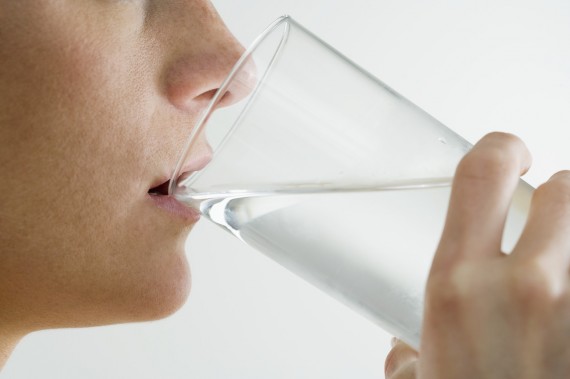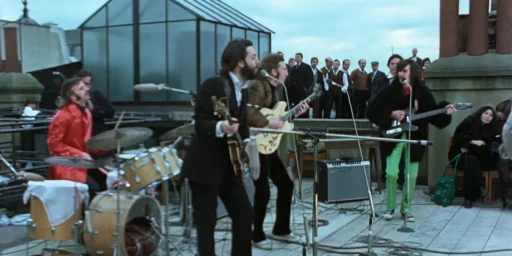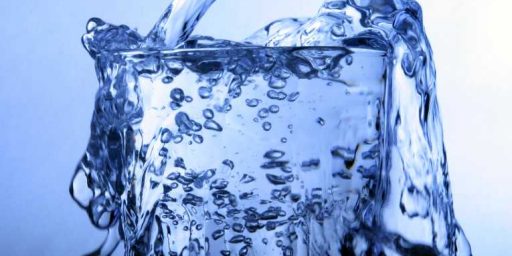No, You Don’t Need To Drink 64 Ounces Of Water A Day
Kevin Drum debunks a myth that seems to persist:
why am I writing about this yet again? Because I’m amused by the fact that every couple of years someone rediscovers this myth, looks into it, and publishes a journal article debunking it. Valtin wrote about water requirements in 2002, the Institute of Medicine tackled the subject in 2004, and in 2008 Dan Negoianu and Stanley Goldfarb published a comprehensive piece in the Journal of the American Society of Nephrology concluding that for normal, healthy people there’s no evidence one way or the other that drinking lots of water has any health benefits. It doesn’t clear your kidneys of toxins, it doesn’t improve organ function, it doesn’t help you lose weight, it doesn’t prevent headaches, and it doesn’t improve your skin tone. (On the other hand, it doesn’t do any harm, either. If you’re thirsty, feel free to drink some water.)
But that was three years ago, so it’s time for another go-around. Jen Quraishi has the latest debunking today, reporting on a piece by Margaret McCartney in the current issue of the British Medical Journal. This time, though, there’s a brand new source of dubious hydration nonsense to be debunked: the bottled water industry:
While McCartney didn’t see evidence backing up the 2-liter-a-day rule, she did see bottled water companies pushing the “water=health” idea to sell more of their products. As McCartney wrote on her blog: “The bottled water industry is pushing the idea that we should drink more than we normally would with the promise of health benefits, and I don’t think there are any. That’s all. And I would recommend tap rather than bottled water: cheaper, and far better for environment.” The bottled water companies were not happy with McCartney’s attitude. In response, the European Federation of Bottled Waters wrote a letter to BMJ about McCartney’s article and cited a recommendation that “at least two liters of water should be consumed per day.”
I’ve always been amused by the fact that the bottled-water industry has succeeded in getting Americans to pay what is,when you compare the numbers, an exorbitant price for a product that comes out of multiple faucets in our homes for a relatively cheap price. At first, the argument was that bottled water tasted better, or was purer. The taste test has been debunked by, well, taste tests that have shown municipal water being picked as “tastes better” than bottled water. As for purity, to the extent you’re concerned about that there are a number of filters you can buy that perform the same function for a cheaper price. Now, it seems, they’re pushing the idea that we need to drink more of their product, which is amusingly similar to some old commercials for soda in the 1950s and 60s that reassured mothers that drinking soda would be good for their children.
So no, you don’t need to drink 64 ounces of water a day, and you don’t need to pay extra for the privilege of drinking whatever amount you might choose to drink.
Update: NPR clues us in to a new phenomenon, Organic Water:
A funny thing happened at the Fancy Food Show in Washington the other day.
We were cruising through the various food exhibits from around the world, checking out the latest goodies, including gluten-free snacks, quinoa in a bag, and relaxation drinks, and then we came upon the food display from Wales.
Perched on a white tablecloth we noticed some very sleek water bottles, labeled Illanllyr SOURCE. A serious guy named Eric Ewell eagerly offered us a taste, “Try this pristine organic water.” We choked back a giggle. Organic? Really?
As the company’s website says, “Illanllyr … comes from our sources beneath certified organic fields in west Wales in the UK.” So, Ewell says, the water has never been tainted with chemicals, making it organic as it as it emerges from the ground.
OK, so the soil above the water source is organic. We get that. But the water itself, organic? Maybe it’s time to separate out the marketing buzz words from the science.
Remember the properties of water? H2O means each molecule of water contains two atoms of hydrogen (H) joined to one atom of oxygen (O). In order for something to be organic — as in alive — it needs carbon. So water, by definition is inorganic.
The U.S. Department of Agriculture, which defines the term organic when it comes to agricultural products in this country, specifically excludes water and salt. Table salt, or NaCl, is made up of sodium (Na) and chlorine (Cl). No carbon there, either, folks.
“This is kind of silly. Of course, people can buy and sell what they want, but this is an example that people know so little about water,” Charles Fishman tells Shots. He’s the author of The Big Thirst: The Secret Life and Turbulent Future of Water.
Stories like this remind me of the an old saying. There’s a sucker born every minute.
Update via Twitter







Our water at home tastes too much of chlorine. But the filtered water coming out of our refrigerator is perfectly good and my wife still insists on not only bottled water but a particular brand of bottled water. Then again, she can pass blind taste tests between multiple brands of bottled water.
Having lived much of my life in desert countries, I’m aware that water is necessary and dehydration can be a real problem. All it takes is a kidney stone or two to get one to decide that erring on the side of a lot of water is preferable to too little.
I guess over-consumption of water–which can be deadly–isn’t seen as much of a problem. I’m pretty sure it’s off the scope of water bottlers, but I’d have thought some mention would be made in the biennial reports on drinking water, debunking or not.
Doug, I don’t fully agree with you or Mr. Drum.
Each person has his or hers own water needs.
Fact . Water does clear toxins from cells, organs and kidneys.
Doctors generally recommend 8 – 9 cups of fluids
each day.
Bottled Water companies do push their product
like any other company. Some are filtered and some just come out of a tap.
Some water does have a taste to it. City water may taste like chlorine.
Well water will probably have iron, copper or other minerals in it.
Filters can negate taste, but the cost, and effort to install
and maintain these filters may keep some people from
using them.
You can also take in too much water or fluids which
can be very harmful depending on your health.
To support my opinions see the link below.
http://www.mayoclinic.com/health/water/NU00283
You body has this mechanism called “thirst,” listen to it and you won’t be far wrong.
Unfortunately, thirst is a lagging indicator of dehydration. If you wait until you are thirsty symptoms of dehydration will worsen before they get better. Depending on what you are doing this may not matter but generally you “drink water for tomorrow”.
I would agree the 2l of water a day recommendation is a rough estimate that in most cases likely errs on the side of over hydration. But it takes an extreme amount of over hydration to hurt you, it doesn’t take much dehydration to start causing significant problems. And it’s true the evidence suggests there is little or no benefit to going beyond sufficient hydration. But sufficient being the key factor there, a surprisingly large number of people are chronically dehydrated.
How much water you personally need is impacted by a large number of factors including climate, activity level, what else you are drinking, eating, what medications you might be on, and you. 2l a day is a made up number that should keep most people hydrated. Those of us that need more than that tend to know. Most daily recommended values are basically made up numbers.
The important thing is that if your are thirsty drink water and only water almost all other beverages will worsen the problem. And drink enough water for what you are doing.
Where the water comes from doesn’t really matter assuming it is potable. The bottled water industry is silly and personally I worry more about the chemicals in the plastic bottles it comes in than I do what’s in the municipal water supply, thought the chlorine levels in that can be worrying. The only caveat there is hard water is kind of nasty to drink. But hard water really is just nasty, and a water softener is a much better investment than continuously buying bottled water.
I think with attention and practice “thirst” gets better. You need to listen. (People new to exaustive sports typically do not.)
(I count as part of thirst how well a sip goes down, it’s good feedback.)
Or put yet another way, 99.9999% of the planet’s species do not need to intellectualize water.
Most spices don’t need to intellectualize a lot of the things we humans intellectualize. It seems we are rather detached from a lot of how our bodies function.
The nut of the problem is that a lot of people (especially those of us in the first world) will drink a soda or some other highly marketed beverage when they are thirsty. Of course this just makes them more thirsty. And you probably are correct that that behavior probably reduces the ability of many people to identify when they need more water.
@john personna:
Nor do they have marketeers telling them they should buy something called “Organic Water” (see the update to the post)
Heh, in the summer I was a wastewater chemist I measured organics in water 😉
Didn’t some study just come out that showed you’d eat less if you drank two cups of water about a half-hour before meal time? I’m sure a new study will come out tomorrow to say the opposite, though.
I’m thinking this essay was a bit light, and with an anti-commercial agenda.
As someone with spinal disc disease (four bad cervical discs, two surgeries, three fused) I can tell you the docs and PT’s all believe based upon clinical evidence that lack of disc hydration is a cause.
Similarly, – pardon, folks, – if the urine ain’t clear, you are not hydrated. The liver and kidney’s are the most wonderful organs on the face of the earth. You’re liver chemically alters fat based toxins into water soluble toxins that the kidney’s and intestines can then excrete. Otherwise you store them in fat. Baaaaaaaaaaaad.
Drink water, people. Drink alot of water. And ingest soluble fiber. (Eat your veggies.) But yes, it doesn’t have to be commercial. But just do it. Any water, anytime, all the time.
The Apache never drinks on the trail (PDF warning), while running down a deer.
Maybe that injunction was overboard, like 8 glasses of water, but it’s amazing to know what we are really built for. A human can run down a deer with no weapons, and kill the exhausted animal with a rock. We are a top predator.
(I think clear pee says that you are safely over-hydrated, which is good enough for most people.)